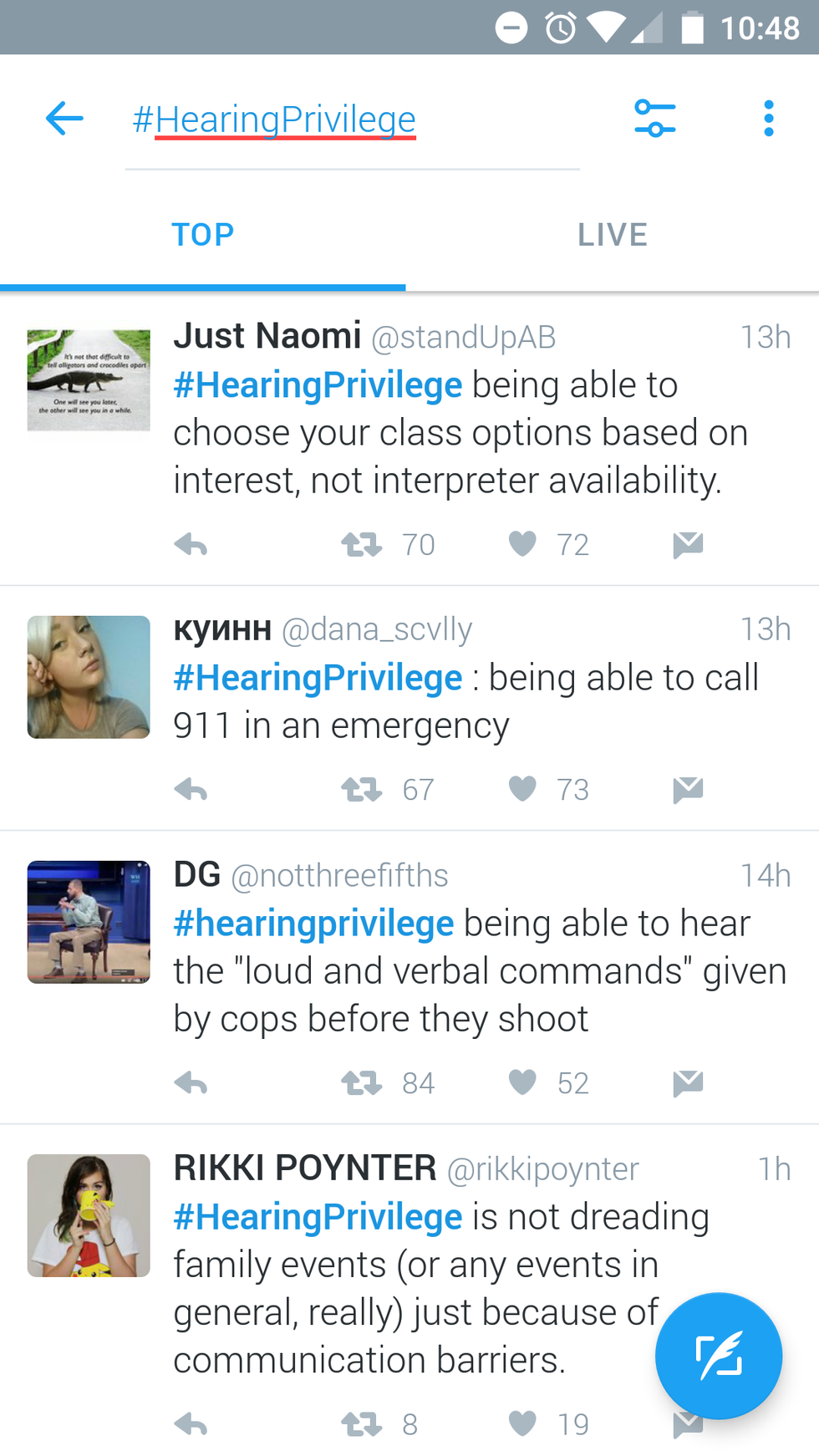As a member of a few subordinate groups, I understand what it's like to feel marginalized, out place, and unwelcome. I've known for a long time that there are certain privileges that some people are granted and they tend not to know that they have it. We have White privilege, male privilege, heterosexual privilege, socioeconomic status privilege and able-bodied privilege. As someone who has experienced being "othered," I've always made it my mission to remain empathetic towards people of other subordinated groups. Going into ASL, I knew that Deaf people had a culture, but I didn't know what that culture was. I didn't know that they had certain qualms with things like cochlear implants and hearing people who are "experts" on Deaf culture and Deaf people in general. After reviewing articles and posts about hearing privilege, I understand now that there are situations where I have the upper hand.
Because of how privilege works, people tend to not know what privileges they have. For example, I am hardly aware of the fact that I don’t have any serious physical or mental illnesses, but I am aware of the fact that I won't be given a ton of opportunities because I'm a Pacific Islander. That being said, I have never considered that the specific struggles Deaf people go through. I never considered how difficult it could be if a Deaf person needed to contact someone in an emergency or how it must be hard to partake in a religious practice if you can't fully understand what is going on. However, through my experiences of being a part of other subordinate groups, I've grown to include my fight for socil justice for people of all subordinate groups. As a male, I've made it my duty to always make it a point to give a voice to women. I do my best to be respectful to them and try and call males on their patriarchal, misogynistic rhetoric or ideals.
As a Speech Pathology & Audiology major and a Social Welfare & Justice minor, my goal is to always keep in mind that I will provide services while advocating for groups that are constantly excluded from political and social conversations. Because of my time spent in ASL 1 and 2, I've decided to make it my mission to become proficient inAmerican Sign Language and provide an empathetic perspective when I have clients who are hard of hearing or Deaf. My mission or duty as an SLP with a client who is hard of hearing will not be to "fix" the client, but rather to give them a professional opinion without pushing the idea of learning to speak or obtaining a cochlear implant the first thing I suggest. It shouldn't be the goal of the Speech Pathologist or the Audiologist to force what we've learned, but rather to give the best care possible, with the idea in mind that it is up to the parents or guardians on how we should move forward. Furthermore, it also shouldn't be the case where SLPs settle with the current therapies and intervention methods in place for clients who are hard of hearing or Deaf. We should attempt to do more research in order to give more options that don't include forcing someone into a corner where they have to choose between looking like a parent that doesn't want their child to be an effective communicator or like someone who wants to fix their child.
I want to provide effective services to clients regardless of their race, gender, sexuality, religious affiliation, physical/mental illness, socioeconomic status. The first step to understanding how to be an advocate or ally for a cause, is understanding where you stand in relation to it. My profession can often be seen as an oppressor to the Deaf community and I think that that's unfortunate, but instead of complaining about how Deaf people are being silly (as I've heard some people in my major do), I want to work with them. I want to learn their culture and their language so we can bridge the gap that people are unwilling to create. Therefore, I'm happy I took ASL with Tammy. She's opened my eyes to an issue that concerns me, or will concern me in the future. So, thank you, Tammy. You're probably one of the greatest instructors I've had here at Marquette.
Click here for a video on hearing privilege.
Click here here for a Tedx at UWM on Deaf Ideology.



















